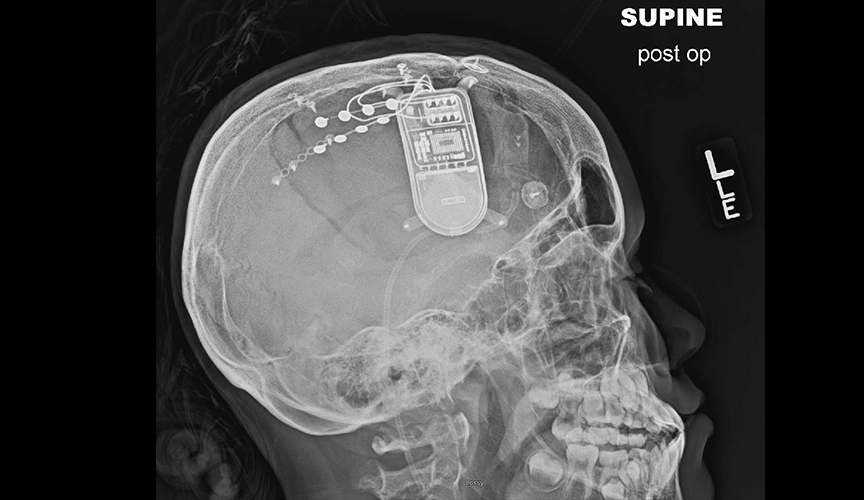Case Study: Katie McCormick
For the last 10 years, Mark and Teresa McCormick could only watch as their daughter, Katie, suffered with seizures.
A decade later, Katie, a patient at Le Bonheur Children’s Hospital, has new hope that doctors can better control her seizures. In May, she became the one of the youngest children in the nation to receive the NeuroPace® RNS® system, a closed-loop brain stimulation system approved by the U.S. Food and Drug Administration for controlling seizures.
Katie was just 5 months old when she had her first seizure. Months passed before Katie had another. Neurologists at their local hospital in Jackson, Miss., tried to control her seizures with medications.
At first the medications helped, but by the time Katie turned 1 year old, the drugs were no longer effective. As Katie’s seizures grew in frequency, Teresa and Mark McCormick became more concerned with their daughter’s health.
“The seizures were a lot more uncontrolled, and they started to change and she was having a lot of small seizures,” Teresa said.
Katie’s condition continued to worsen and their neurologist referred them to Le Bonheur Children’s Hospital. The hospital’s Comprehensive Epilepsy Program is led by James Wheless, MD, chief of pediatric neurology and co-director of the Neuroscience Institute, and Pediatric Neurosurgeon Frederick Boop, MD, chairman of the Department of Neurosurgery at the University to Tennessee Health Science Center and co-director of the Neuroscience Institute.
At Le Bonheur, an MRI revealed an abnormality of Katie’s brain as the source for her seizures. She was diagnosed with partial onset epilepsy. That’s when the McCormicks began discussing surgical options with doctors and soon after Katie underwent a frontal lobe resection. Katie had a second surgery, a frontal lobectomy, the following year. Results were promising at first, but the seizures returned — this time more severe.
“She developed drop seizures where she would lose control and hit the floor,” Teresa said. “That got pretty tough because she was a toddler trying to walk and we pretty much had to keep her in a stroller and not put her down because she would lose control.”
In the next four years, Katie underwent several more surgeries, including a corpus callosotomy and a placement of a ventricolo-peritoneal shunt, but her seizures always returned. While the procedures provided partial relief from her seizures, daily activities, such as going to school or playing in her bedroom, remained difficult.
At school, Katie had small seizures during class, but most weren’t severe enough for teachers or classmates to notice. At home, Mark and Teresa were afraid of letting her stay in a room by herself, she was forced to take medication three times a day and she attended therapy lessons three times a week. The McCormicks wouldn’t let their daughter sleep in her bedroom alone because of the frequent seizures, which usually occurred around bedtime or early in the morning.
“It’s so hard to watch her go through this all the time,” Teresa said. “You’re not in control and that’s a hard thing as a parent. You’re not in control of what’s going on with your child and you aren’t able to step in and fix it.”
On May 12, Boop implanted the RNS Neurostimulator within Katie’s skull, beneath the scalp. The neurostimulator is connected to two leads placed on the area of the brain that triggers the seizures.

In May, Le Bonheur doctors placed a NeuroPace RNS system on Katie McCormick's brain to help control her seizures.
For the next two weeks, Teresa and Mark used a computer to track and upload Katie’s EEG (brain wave data) information nightly to the NeuroPace Patient Data Management System (PDMS), an interactive web-based database used for storage and clinician remote access. Le Bonheur doctors then reviewed the data and began adjusting the device’s impulse setting. On May 23, the RNS device was activated.
The McCormicks will continue to monitor Katie’s seizure activity levels nightly and upload the information to the online database. When she returns for checkups, doctors will be able to adjust the strength of the impulses, if necessary.
Help us provide the best care for kids.
Le Bonheur Children's Hospital depends on the generosity of friends like you to help us serve 250,000 children each year, regardless of their family’s ability to pay. Every gift helps us improve the lives of children.
Donate Now










